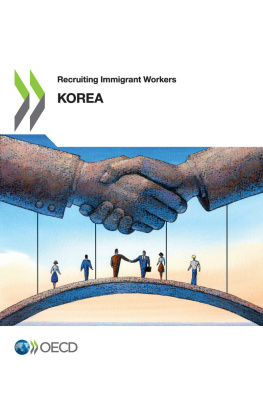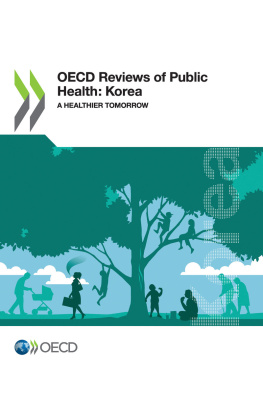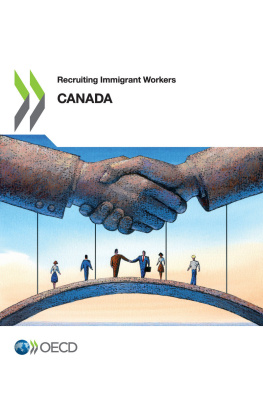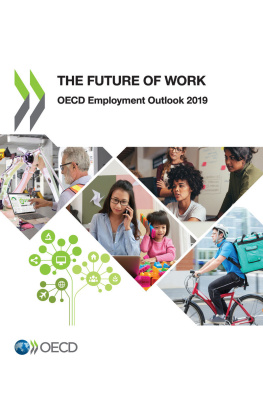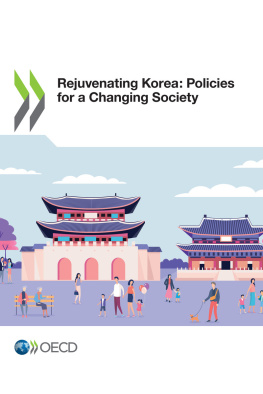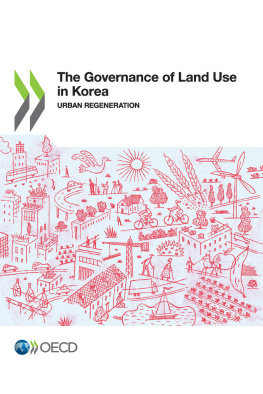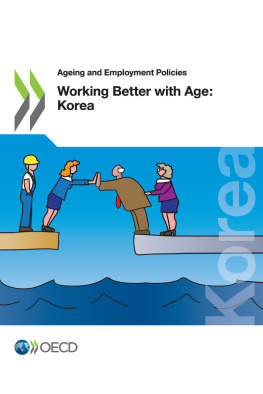OECD - Recruiting Immigrant Workers: Korea 2019
Here you can read online OECD - Recruiting Immigrant Workers: Korea 2019 full text of the book (entire story) in english for free. Download pdf and epub, get meaning, cover and reviews about this ebook. year: 2019, publisher: OECD Publishing, genre: Politics. Description of the work, (preface) as well as reviews are available. Best literature library LitArk.com created for fans of good reading and offers a wide selection of genres:
Romance novel
Science fiction
Adventure
Detective
Science
History
Home and family
Prose
Art
Politics
Computer
Non-fiction
Religion
Business
Children
Humor
Choose a favorite category and find really read worthwhile books. Enjoy immersion in the world of imagination, feel the emotions of the characters or learn something new for yourself, make an fascinating discovery.
Recruiting Immigrant Workers: Korea 2019: summary, description and annotation
We offer to read an annotation, description, summary or preface (depends on what the author of the book "Recruiting Immigrant Workers: Korea 2019" wrote himself). If you haven't found the necessary information about the book — write in the comments, we will try to find it.
OECD: author's other books
Who wrote Recruiting Immigrant Workers: Korea 2019? Find out the surname, the name of the author of the book and a list of all author's works by series.
Recruiting Immigrant Workers: Korea 2019 — read online for free the complete book (whole text) full work
Below is the text of the book, divided by pages. System saving the place of the last page read, allows you to conveniently read the book "Recruiting Immigrant Workers: Korea 2019" online for free, without having to search again every time where you left off. Put a bookmark, and you can go to the page where you finished reading at any time.
Font size:
Interval:
Bookmark:
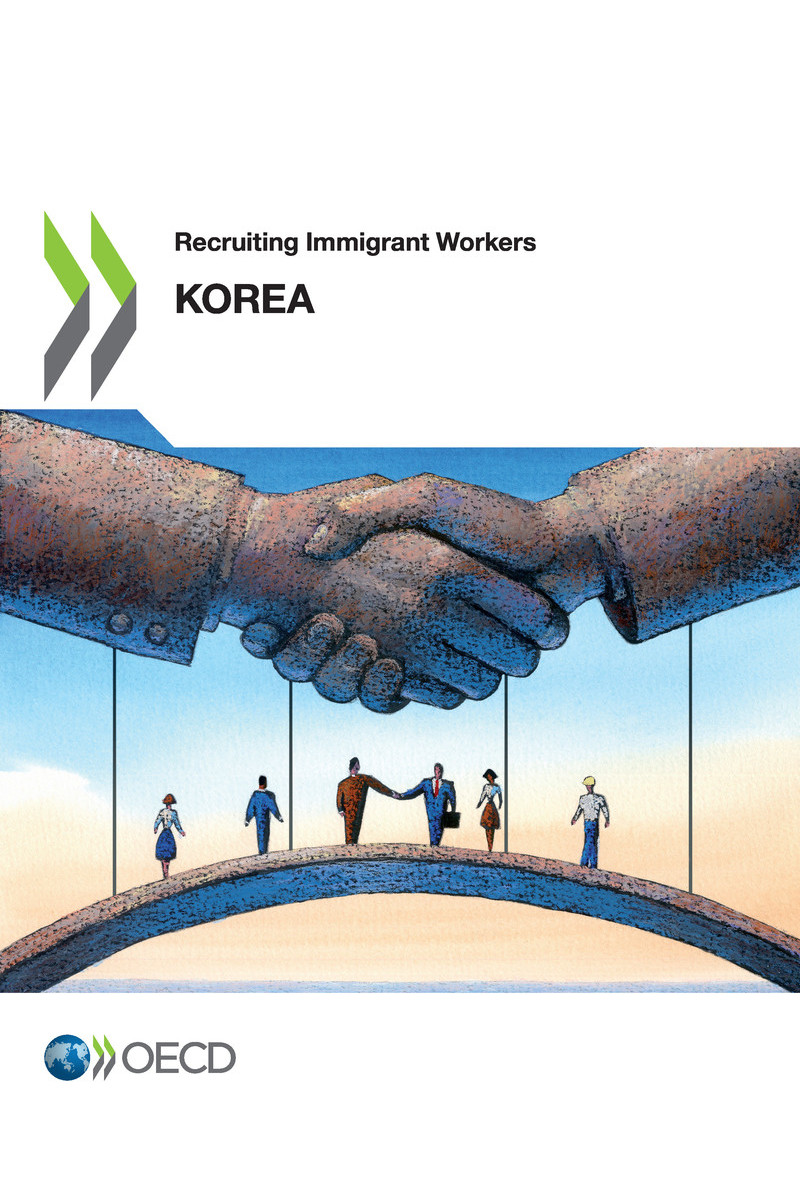
OECD (2019), Recruiting Immigrant Workers: Korea 2019 , Recruiting Immigrant Workers, OECD Publishing, Paris.
https://doi.org/10.1787/9789264307872-en
This review of Koreas labour migration policy is the ninth of a series conducted by the OECD Secretariat as a follow-up to the 2009 High Level Policy Forum on International Migration. The rationale for this initiative was the recent growth in labour migration observed in many countries and the likelihood that recourse to labour migration would increase in the context of demographic ageing. Prior to the global economic crisis of the late 2000s, many countries had made substantial changes to labour migration policies with a view to facilitating recruitment from abroad. With the introduction of these changes, more prominence was accorded to the question of their effectiveness, and more broadly to the objectives of labour migration policy in general. Although the economic crisis put a damper on labour migration movements, it did not stop them entirely, and interest in labour migration policy is unlikely to diminish in the near future.
The central objective of labour migration policy is to help meet those labour market needs which cannot be satisfied through tapping domestic labour supply in a reasonable time frame, without adversely affecting the domestic labour market and without hindering development prospects in vulnerable origin countries. Although the objective itself can be easily stated, specifying the criteria for assessing the success of policy in achieving it is a complex matter. It involves evaluating how well labour market needs have been identified and whether migration has had an impact on the labour market, both of which are analytically difficult.
This series of reviews addresses the question of whether labour migration policy is effective in meeting labour market needs without adverse effects, and whether the policy is efficient. To address these questions, this review aims to analyse two key areas: i) the labour migration system and its characteristics, in terms of policies in place and the labour migrants who arrive; and ii) the extent to which it is responding to the current and forecast needs of the domestic labour market, as well as any impact on the latter.
Korea faces a similar discussion as other OECD countries regarding effective labour migration policy, and it is in this context that Korea requested that the OECD review its labour migration policy. The temporary foreign worker programme introduced in Korea in the mid-2000s has led to a significant share of jobs in manufacturing SMEs being taken up by these workers. At the same time, Koreas globalisation strategy has aimed to attract more high-skilled foreigners and mobile talent, but numbers remain low.
This review asks the question of what should be the role of discretionary labour migration policy in the specific context of the country, given the profound structural changes underway in the Korean labour market and the challenges in ensuring human resources to maintain productivity and social cohesion in the future.
This review, the ninth in a series, was conducted by the OECD Secretariat as a follow-up to the 2009 High Level Policy Forum on International Migration. This review was written by Jonathan Chaloff, with statistical support from Veronique Gindrey and Jongmi Lee. Contributions were provided by Marina Belmonte, Wookyung Jung, Christina Kim, and Jongmi Lee. It benefited from valuable comments from Jean-Christophe Dumont. Delegates to the OECD Working Party on Migration discussed a draft of this Review in June 2018 and provided comments. The OECD Secretariat would like to thank the Ministry of Employment and Labour for its support for the Review. In addition, the Secretariat would like to thank the Ministry of Justice as well as Human Resources Development Korea for comments.
Font size:
Interval:
Bookmark:
Similar books «Recruiting Immigrant Workers: Korea 2019»
Look at similar books to Recruiting Immigrant Workers: Korea 2019. We have selected literature similar in name and meaning in the hope of providing readers with more options to find new, interesting, not yet read works.
Discussion, reviews of the book Recruiting Immigrant Workers: Korea 2019 and just readers' own opinions. Leave your comments, write what you think about the work, its meaning or the main characters. Specify what exactly you liked and what you didn't like, and why you think so.

